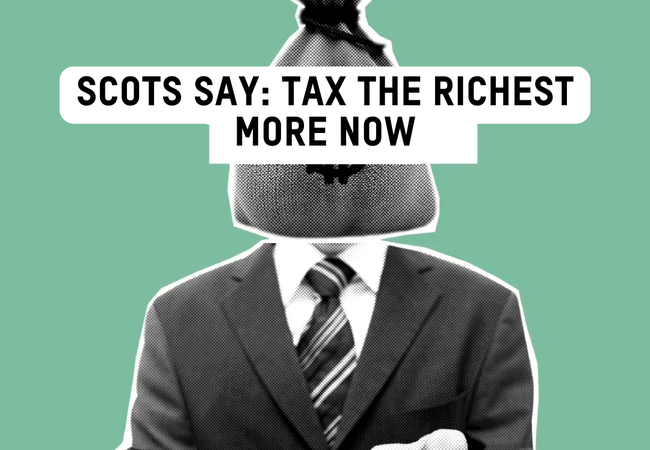


I'm Admin in the United Kingdom
25 Mar, 2025
4 mins read time
Scots say: increase taxes on the richest, rather than make cuts to public spending

I'm Admin in the United Kingdom
25 Mar, 2025
4 mins read time
New polling reveals people in Scotland would overwhelmingly prefer the very richest to pay more in tax rather than see cuts to public spending, as parallel Oxfam analysis shows the UK’s wealthiest people continue to amass even greater fortunes.
It comes as new number crunching by Oxfam, Patriotic Millionaires UK and Tax Justice UK finds that UK billionaires have seen their fortunes swell by £11 billion in the past 12 months alone - the combined amount the UK Government plans to cut from international aid and social security entitlements for people in the UK with disabilities or illnesses.
Campaigners say the data shows the UK Government’s recent cuts are not about financial scarcity, but rather about political priorities, and they sharply contrast with public opinion.
The polling, carried out ahead of the Spring Statement by YouGov on behalf of Oxfam, shows that people aged over 16 in Scotland strongly back action to fairly tax the wealthiest:
- 68% think the very richest should pay more in tax.
- More than three-quarters (79%) would rather tax the very richest than see cuts to public spending.
- 79% support a new 2% wealth tax on assets worth more than £10 million.
The findings pile further pressure on the UK Government to introduce wealth taxes on the richest millionaires and billionaires.
Tax justice campaigners have identified a series of fair tax reforms and loopholes that could be closed to raise additional revenue. They say that a 2% wealth tax alone, applied to assets worth more than £10m, could raise up to £24 billion annually or around £460 million a week while only impacting 0.04% of the population – around 20,000 people.
For illustrative purposes, if the 2% wealth tax on assets over £10 million was introduced now, UK billionaires would still have seen their personal wealth soar by an average of £141 million each – a total of nearly £7.5 billion combined - since this time last year.
The money raised could be used to reduce poverty and inequalities, strengthen public services, including the critical care sector, and boost climate action, instead of padding the pockets of the super-rich while deepening economic, gender and racial inequalities.
Jamie Livingstone, Head of Oxfam Scotland, said: “We all feel it in our bones: it’s indefensible that public spending to support those in poverty and crisis is being slashed, while private wealth is quietly stashed away. People in Scotland are crystal clear: they’d rather tax the richest than see cuts to public spending. Yet the UK Government has chosen to snatch £11 billion from the pockets of those who need it most while the same amount has been added to the bloated bank balances of those who need it least in just 12 months. It’s time for the UK Government to put fairness first; tax the super-rich and protect people in poverty. The choice is that simple.”
Mark Campbell, entrepreneur and member of Patriotic Millionaires UK, said: “As a millionaire I know the economy is working for a few people like me and working against the vast majority. Spending cuts are short-sighted and will only increase the worries of millions of people in the UK who are struggling to put food on the table and heat their homes. Meanwhile, the very richest people in our society are watching their wealth grow exponentially. It seems outrageous that the wealth of the richest is taxed at a much lower rate than the income of working people who will bear the brunt of these budget cuts.
“A wealth tax is a very clear alternative. Given that most people want higher taxes on the very richest, and plenty of millionaires – people like me – also want it, what’s stopping the UK Government?”
As part of Tax Justice Scotland, a campaign backed by more than 50 diverse civil society organisations, think tanks, trade unions and academics, Oxfam Scotland is urging the UK and Scottish Governments to use their respective tax powers to fairly raise more money to enable greater investment in key poverty-reducing public services, like care, while combatting inequalities, and rewarding businesses that provide fair and flexible work – including for parents, and particularly women – while paying the real Living Wage.
Oxfam Scotland says the Scottish Government must also use devolved powers to help combat the growing gap between the wealthiest and those struggling to make ends meet, with the richest 10% having 217 times more wealth than the least wealthy 10%, and with record high income inequality.
Wealth inequality is not only deeply unfair, but a barrier to reducing poverty. It exacerbates social and environmental harms, fuels wider inequalities – such as those related to gender and race, and drives a wedge between those with wealth and those without it.
Campaigners are calling on Scottish Ministers to use the devolved tax tools at their disposal, such as landing a fair tax on pollution-spewing private jets using Scotland’s airports and finally replacing the discredited Council Tax with a system to tax property wealth fairly.
Jamie Livingstone added: “Scotland’s political leaders can’t afford to wait for Westminster to make the fair and obvious choice to make the wealthiest pay their share. As we approach the 2026 Holyrood election, they would be fool hardy to ignore the public mood. People want to see real progress on fairness. Scotland has powers to tax wealth more fairly to combat runaway inequality and to build a better and greener country, it’s time to use them.”
/ENDS
For more information and interviews, please contact: Rebecca Lozza, Media and Communications Adviser, Oxfam Scotland: rlozza1@oxfam.org.uk / 07917738450.
Notes to Editors
- All figures, unless otherwise stated, are from YouGov Plc. Total sample size was 1,007 adults in Scotland. Fieldwork was undertaken between 17th - 21th March 2025. The survey was carried out online. The figures have been weighted and are representative of all adults in Scotland (aged 16+).
- Find out more about Tax Justice Scotland here: https://taxjustice.scot/
- If a 2 per cent wealth tax was introduced for people with net assets exceeding £10 million, it’s estimated that £24 billion could be raised in tax revenue every year - £460 million a week. https://arunadvani.com/taxreform.html.
- Read Tax Justice UK’s briefing, Ten tax reforms and closed loopholes to raise over £60 billion in a single year: https://taxjustice.uk/blog/how-to-raise-60-billion-for-public-services-our-ten-tax-reforms/
- All billionaire data is from Forbes live billionaire list from 19 March 2024 to 19 March 2025. Included in the analysis are only the 53 billionaires who were on the list on both dates. All figures are nominal. A 0.77 exchange rate was used to convert to GBP from USD.
- On 19th March 2024, the total wealth of UK billionaires was £169.939bn, on 19th March 2025 £181.027bn. A difference of £11.088bn.
- To calculate the average £141m that UK billionaire wealth would have still grown over the last year if the proposed wealth tax had been in place, £10m was deducted from each billionaire’s current wealth (March 2025) to account for the tax threshold. The two per cent tax was then deducted. This new total was then compared to each billionaire’s wealth in March 2024. The difference was then averaged across the 53 billionaires.
- Patriotic Millionaires UK is a nonpartisan network of British millionaires, from multiple industries and backgrounds from across the UK. It delivers a single mission - to leverage the voice of wealth to build a better Britain by changing the system to end extreme wealth and make those with it make their fair and proper contribution.
- Tax Justice UK is a campaigning and advocacy organisation. Our mission is to ensure that everyone in the UK benefits from a fair and effective tax system. We are not-for-profit and politically non-aligned. Tax Justice UK is a partner of - but independent from - the Tax Justice Network.